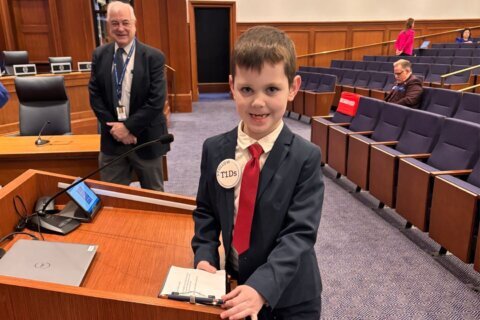Virginia lawmakers approved a ban on handheld cellphone use while driving, new anti-discrimination protections and changes aimed at keeping students from being arrested for issues that could be handled through school discipline as part of many votes Thursday and Friday.
The ban on handheld cellphone use while driving would not apply when parked, stopped or in emergencies. It is one part of a wider-ranging road safety and transportation funding proposal being addressed through other bills that are still moving forward.
Bills headed to Gov. Ralph Northam’s desk include a new $5 fee on Virginia State Police tickets to fund an electronic ticketing system that significantly sped up traffic stops during a Northern Virginia trial run, new protections for payday loans and a change to make needle exchanges in the state permanent.
Lawmakers still have lots of work left to do in the final two weeks of the session, including working out agreements on disputed aspects of the House and Senate budgets that passed their respective chambers Thursday.
Plans for redistricting next year also remain up in the air due to a split over a state constitutional amendment that was eventually approved last year in watered-down form to get it through the 2019 General Assembly.
The exact same language would have to pass again this year, then be approved by voters in November to apply next year.
One competing alternative still on the table would set up a similar bipartisan panel through legislation to draw only 2021 lines, leaving long-term redistricting reform options open for the future.
Discrimination
A ban on discrimination based on hairstyles associated with race is headed to Northam for his signature. The bill specifically highlights hair texture, hair type and styles, such as braids, locs or twists, as being protected under race-based nondiscrimination laws.
Lawmakers also gave final approval to bills that remove race from marriage, divorce and annulment documents, and that repeal unconstitutional poll taxes and other racist voting laws that technically still remain on the books.
A separate bill headed to the governor would ban discrimination against people with disabilities in decisions about who receives an organ donation.
School discipline
Beyond school funding and teacher raises proposed in the House and Senate budgets, lawmakers sent bills to the governor that aim to address other school issues.
Virginia would collect data on the use of force and arrests by school resource officers, including information about the breakdown of incidents by a student’s race, gender or disability. The officers would also be required to have training on bias and de-escalation.
Other bills would leave it to school principals to decide whether most misdemeanor offenses require calling police, or if they can be better handled through school discipline processes.
Current law requires calling police for all crimes.
The General Assembly has also approved bills increasing job security for some teachers and providing minimum state standards for protections for transgender students.
Housing
Homeowners interested in putting up solar panels could face fewer restrictions from their homeowners associations in some cases.
A bill headed to the governor would lay out exactly what reasonable restrictions homeowners associations are allowed to impose, and what restrictions they cannot impose.
A bill that would have banned discrimination by local governments in land use decisions based on the inclusion of affordable housing in a development is dead for the year, so that lawmakers can try to work out special rules for localities with large shares of low-income residents.
The bill will likely return in 2021.
Other bills headed to Northam
Bills matching electric bike descriptions to industry standards, expanding the State Board of Elections from three to five members, and regulating music therapists and art therapists got final approval on Thursday and Friday.
The General Assembly also passed bills protecting crime victims from inquiries into their immigration status, requiring campaign finance disclosures in online ads and repealing a ban on Metro using project labor agreements.
The state is also set to ban duck blinds in areas where hunting is restricted, which is a bill specifically targeting an area in southeastern Fairfax County.







